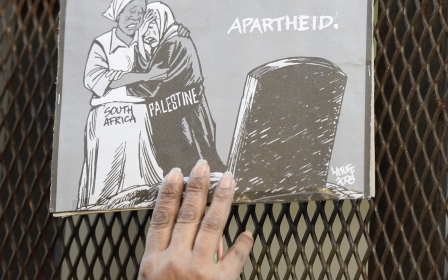Israel's bill banning Palestinian family unification aims to stop 'right of return'

Israel's Interior Minister Ayelet Shaked said a bill proposing to ban Palestinian family unification is intended for "demographic reasons" and meant to stop the "creeping right of return".
In an interview with Yedioth Ahronoth newspaper on Wednesday, Shaked said "we don’t need to mince words, the law also has demographic reasons," referring to the bill that passed a first reading in the Israeli parliament, the Knesset, on Monday.
The bill known as the Citizenship Law, brought forward by Shaked and supported by right-wing parties both in government and the opposition, cites security reasons behind the ban.
Two more votes in the Knesset are required for the bill to become law, which would block citizenship or residency to Palestinians from the occupied West Bank and the Gaza Strip, and their unification with their spouses who hold Israeli citizenship.
"The law wants to reduce the motivation for immigration to Israel. Primarily for security reasons, and then also for demographic reasons," Shaked said in the interview.
The current Israeli government, which was formed last summer, failed in July to extend an earlier version of the law that existed for 18 years.
The Citizenship and Entry Law was nominally a piece of emergency legislation that was passed in 2003 to prevent Palestinians from the West Bank and Gaza Strip from gaining residency or citizenship of Israel through marriage to another citizen.
The law, which was extended yearly, has been criticised by Palestinians as racist, although Israeli authorities claim it is necessary to prevent "terrorists" from entering Israel.
On Monday, the Knesset voted 44-5 in favour of Shaked’s amendments to the law.
She then took to Twitter to thank those who voted in favour of the bill saying that "Zionism and common sense prevailed".
Apartheid accusations
Shaked's comments come a week after Amnesty International released a report accusing Israel of pursuing policies that "benefit Jewish Israelis while restricting the rights of Palestinians" since 1948.
"Israel’s system of institutionalised segregation and discrimination against Palestinians, as a racial group, in all areas under its control amounts to a system of apartheid, and a serious violation of Israel’s human rights obligations," the UK-based group said in the 280-page-report.
Amnesty became the latest organisation to join a cadre of human rights groups that have labelled Israel as an apartheid state.
"The segregation is conducted in a systematic and highly institutionalised manner through laws, policies and practices, all of which are intended to prevent Palestinians from claiming and enjoying equal rights with Jewish Israelis," it said.
The report, which was based upon research conducted from 2017 to 2021, said Israel’s discriminatory treatment of Palestinians affects both Palestinian citizens of Israel, which make up 20 percent of the country's population, and the five million Palestinians living under Israeli occupation.
Apartheid is a legal term defined by international law that refers to systematic oppression by one racial group over another.
Middle East Eye propose une couverture et une analyse indépendantes et incomparables du Moyen-Orient, de l’Afrique du Nord et d’autres régions du monde. Pour en savoir plus sur la reprise de ce contenu et les frais qui s’appliquent, veuillez remplir ce formulaire [en anglais]. Pour en savoir plus sur MEE, cliquez ici [en anglais].





